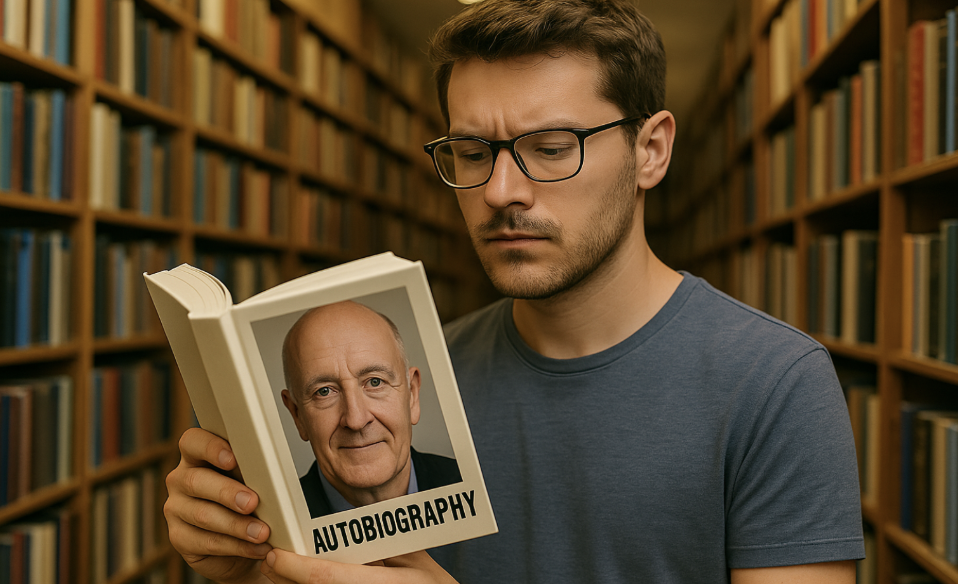So you want to write about your life, but what shelf will your story end up on? Will it sit beside presidential memoirs or cradle up next to tell-all tales of self-discovery? Welcome to the great literary fork in the road: autobiography vs memoir.
At first glance, they seem like twins—both built from the raw material of your life, both bursting with personal stories. But when it comes to structure, scope, and voice, the difference between memoir and autobiography is more than just a technicality. One zooms out for the full panoramic view, the other zooms in with emotional close-ups. One is a life chronicle; the other is a themed slice of it.
In this guide, we’ll break down what makes each form tick, show you how to spot the difference in the wild, and help you figure out which format is best suited for your own epic (or wonderfully ordinary) tale. Let’s shelve the confusion and open the right chapter, shall we?
What Is a Memoir, Anyway?
Let’s start with the basics: What is a memoir? In short, it’s your life—on your terms. A memoir isn’t about logging every birthday, dental appointment, or job change. Instead, it’s a focused, emotional, and often thematic deep dive into a specific period, experience, or perspective that shaped who you are. Think less “timeline,” more “highlight reel.”
If an autobiography is a resume, a memoir is a diary entry you’ve edited for public consumption (you know, the version where your inner monologue is a little wittier and the awkward parts are wrapped in profound reflection). Memoirs thrive on vulnerability and voice. They aren’t just about what happened—they’re about what it meant.
Take Educated by Tara Westover, a story not of her entire life, but of her struggle to reconcile a rigid, survivalist upbringing with her thirst for knowledge and self-determination. Or Becoming by Michelle Obama, which walks us through her journey from the South Side of Chicago to the White House—not as a list of achievements, but as a personal evolution.
Memoirs connect because they don’t just tell us what the author did; they show us how it felt. They invite readers into the raw, messy, meaningful parts of life. So if you’ve lived through something that taught you, broke you, changed you, or made you laugh-cry into your laptop, congratulations: you’ve got memoir material.
The Autobiography: All the Facts, Please
Now let’s flip to the other side of the bookshelf. While memoirs are all about moments and meaning, an autobiography is the full sweep of a life, from start to (almost) finish, baby photos to legacy projects. Think structured, chronological, and impressively thorough.
In the grand literary showdown of autobiography vs memoir, the autobiography takes the documentary route. It aims to inform, not just reflect. You’ll find birth dates, career moves, public milestones, and major achievements, often presented with a tone of distance or formality. If a memoir is about feelings, an autobiography is about facts, with feelings optional.
Helen Keller’s The Story of My Life is a classic example. It’s a detailed record of her early life, education, and rise as a writer and activist. It’s not just a story—it’s a record, almost archival in its detail. That’s not to say autobiographies lack voice or artistry, but their mission is more about documenting than storytelling.
And what about biographies? Here’s where it gets even more fun. The biography definition is simple: it’s a life story, too, but written by someone else. Autobiography = you writing about yourself. Biography = someone else doing the honors (and hopefully fact-checking).
In short, if you want to chronicle your entire life with a sense of completeness and credibility, the autobiography is your jam. But if your goal is to unpack a powerful moment, a particular theme, or a chapter that changed everything, maybe it’s time to get a little memoir-mental.
Memoir vs Autobiography: What’s the Real Difference?
Alright, time for the real tea: what’s the actual difference between memoir and autobiography? They may both spill the beans on someone’s life, but they do it with very different storytelling tools—and very different intentions.
If you’re still mixing them up, don’t worry. You’re not alone. It’s a bit like confusing a movie trailer with the full film. Same subject, different runtime, mood, and purpose. Or to put it in bookshelf-speak: memoir is the highlight reel, autobiography is the box set.
Let’s break it down:
| Feature | Memoir | Autobiography |
| Focus | A theme, event, or emotional journey | Full life story |
| Structure | Thematic or fragmented | Chonological |
| Tone | Personal, introspective, emotional | Formal, informative, comprehensive |
| Purpose | To reflect, connect, express | To record, inform, preserve |
| Scope | Selective life moments | Whole life span |
| Audience | General readers, memoir lovers | Historians, scholars, fans |
| Examples | Educated by Tara Westover, The Glass Castle by Jeanette Walls | The Story of My Life by Helen Keller, Long Walk to Freedom by Nelson Mandela |
Let’s say you climbed Everest and want to share the experience—the fear, the triumph, the frostbite-induced epiphanies. That’s a memoir. But if you want to start from childhood dreams of mountain climbing all the way through your post-Everest speaking career? That’s autobiography territory.
Memoirs thrive on theme and feeling. Autobiographies aim for scope and accuracy. Both are valid, powerful forms of storytelling—but the key difference lies in what you’re trying to say, not just what happened.
So when choosing your genre, ask: Am I writing about my life, or what life taught me? The answer will point you toward the right narrative—and the right shelf.
Your Publishing Journey Awaits – Start NowSo, Which One Should You Write? (The Ultimate Litmus Test)
You’ve got the memories. You’ve got the urge. Now all that’s left is deciding: autobiography vs memoir—which one should you write?
Let’s run a quick vibe check.
Are you itching to share the whole story? From your first scraped knee to your retirement party toast? You might be leaning toward an autobiography. It’s perfect if you’ve lived a public life, have a legacy to document, or just want to get everything down for future grandkids, historians, or the occasional literary nerd.
But if what’s calling to you is one chapter—that year abroad, that unexpected detour, that wild job, that time a pet llama completely altered your view on love and purpose—then congratulations: you’re memoir material.
Ask yourself:
- Am I writing to inform or to connect?
- Do I want to be comprehensive, or do I want to zoom in on a transformative experience?
- Is my story more about what happened or how it felt?
Here’s another clue: if you’re structuring your story around events and achievements, you’re probably writing an autobiography. If you’re organizing around themes and emotions, that’s memoir territory.
Still unsure? Try this: imagine your book in a bookstore. Will it sit next to presidential life stories or next to stories of healing, growth, and grit? That mental placement might just make your decision for you.
Bottom line: your story matters either way. The key is choosing the format that brings out its full power—and gets it into the hands (and hearts) of the right readers.
The Creative Payoff: Why the Distinction Matters
Choosing between memoir and autobiography isn’t just about filing your manuscript in the right section—it’s about unlocking your best voice as a storyteller. The form you pick shapes not only how you tell your life story, but also how readers receive, relate to, and remember it.
An autobiography offers a legacy. It cements your milestones in the literary record, turning your lived experience into something archival, reference-worthy, and enduring. It’s a historical gift to the future.
A memoir, on the other hand, offers connection. It invites readers into your personal narrative with raw honesty, insight, and emotional truth. It’s not about what you did; it’s about what it meant—and why it might matter to someone else.
When you choose the right frame for your story, you don’t just write—you resonate. Whether your goal is to inform, inspire, or simply make someone nod and say, “Me too,” clarity of genre gives your story the authenticity it deserves and the impact it’s capable of.
Because how you tell your story? That’s part of the story, too.
Write Like You Mean It
So, what’s the final word in the great autobiography vs memoir debate? It’s all about intention. If you’re aiming to chart your entire journey from birth to brilliance, the autobiography has your name all over it. If you’re diving into a pivotal chapter, theme, or emotional arc, the memoir’s your literary soulmate.
The real takeaway? Your life story matters. And whether it’s buttoned-up and chronological or raw and reflective, telling it with purpose is what gives it power. So choose your genre, sharpen your voice, and start writing like you mean it.
Memoir or autobiography—either way, your story deserves to be told.
FAQs – Autobiography vs Memoir
Q1: Are memoirs written in the first person?
Yes, absolutely. Memoirs are almost always written in the first person because they’re based on the author’s personal experiences and emotions. You’re not just telling a story—you’re inviting readers to see the world through your eyes. So go ahead and say “I” a lot—this is your show.
Q2: How is a diary different from a memoir or an autobiography?
Think of a diary as the raw footage. Diaries are typically private, unfiltered, and written in the moment. Memoirs and autobiographies, on the other hand, are edited and crafted with a broader audience in mind. A memoir focuses on emotional themes; an autobiography gives the full life tour. A diary just spills the tea, day by day.
Q3: Is it vain to write a memoir?
Only if you write it like a press release. Writing a memoir isn’t about ego—it’s about connection. The best memoirs don’t say “look at me,” they say “here’s what I’ve learned—maybe you’ve felt this too.” If your goal is to be honest, vulnerable, and generous, then no, it’s not vain—it’s brave.
Q4: Can you fictionalize a memoir?
Only a little—and label it. You can change names, compress time, or recreate dialogue to the best of your memory, but the core events should be true. If you take too many liberties, you’re writing autobiographical fiction, not a memoir. Just be transparent with readers about where fact meets flair.
Q5: What qualifies a book to be a memoir?
It’s all about focus and authenticity. A memoir zooms in on a slice of your life—usually one that’s rich with transformation, emotion, or insight. It’s not about covering everything—it’s about meaningfully exploring something. If your book tells a true story that reflects your personal journey, welcome to memoir territory.
Q6: What should you not write in a memoir?
Avoid legal landmines and emotional oversharing. Don’t include unverified accusations, confidential information, or full-on revenge plots. And skip the unedited therapy session—your memoir should be reflective, not reactive. Keep it truthful but thoughtful, and always write with empathy, even for the villains.








